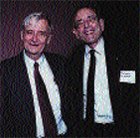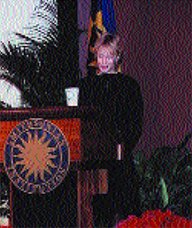Opening Remarks (The Future of Life: Opening remarks)
Contents
The Future of Life: Opening remarks
| Topics: |
This content is not assigned to a topic
|
Series: The John H. Chafee Memorial Lecture on Science and the Environment
2nd National Conference on Science, Policy and the Environment
Primary Speaker: Dr. Edward O. Wilson
Date: December 6, 2001
Location: Smithsonian National Museum of Natural History, Washington, DC
Richard Elliot Benedick, President, NCSE
I have the privilege of being president of the unique organization that is sponsoring this conference, the National Council for Science and the Environment. As president, one of my most enjoyable chores is to publicly acknowledge leaders in the fields of environment and science. After all of the outstanding high points in the first day of this two-day conference, it is extremely rewarding to see how the conference is unfolding: the brilliance of the speakers and the interaction among the participants exceed all my expectations. After this series of highlights, it is my pleasure to welcome you tonight to an event that would be the high point of any conference in the United States — the second annual John H. Chafee Memorial Lecture.
We honor at this lecture a great senator who was a champion of all that is entailed in the vision of the National Council for Science and the Environment, namely, improving the scientific basis for environmental decisionmaking. A number of distinguished people are speaking on this subject today and tomorrow whose names are synonymous with the environmental and scientific communities.
John Chafee was an outstanding American, whom I personally had the honor of knowing and working with while I was in the State Department, responsible for population issues and subsequently for environmental affairs. None of these issues was more crucial and, at the same time, more controversial, than protection of the stratospheric ozone layer, as represented in the Montreal Protocol of 1987. It was referred to this morning by several speakers, including our keynote speaker, Donald Kennedy, president emeritus of Stanford University and now editor of the journal Science.
This landmark success in diplomatic history and environmental history could never have occurred without Senator John H. Chafee, and I personally was honored and deeply touched by his interest and support. For a while, it seemed as if domestic opponents of a strong treaty would prevail in undermining the American position which I was representing at tough international negotiations. But John Chafee was a pillar of strength in the halls of Congress in helping to preserve our position. The rest is history, as you all know.
Before we turn to our distinguished lecturer, I would like to introduce a member of the Chafee family, Georgia Chafee Nassikas. She has a degree in design, worked in architecture, is a passionate organic gardener, an artist and mother of four children; her husband is from Greece. Welcome, Mrs. Nassikas, speaking on behalf of the Chafee family.
Georgia Chafee Nassikas
Thank you, Ambassador Benedick and members of the National Council for Science and the Environment. On behalf of the Chafee family, I thank the Council for holding tonight’s second annual lecture in celebration of my father’s environmental legacy.
We are looking forward to Dr. Wilson’s lecture on the science and solutions behind sustainable development. I feel privileged to be here tonight to hear first hand from the man whose books I have so enjoyed.
How pleased my father would be to see here so many working to save the natural world around us—the air that sustains us; our living waters, salt and fresh; our unbuilt lands, and all the wild creatures dwelling therein. My father worked tirelessly toward that goal. How fitting that this lecture bears his name.
John Chafee lived by the words of the most famous conservationist, Theodore Roosevelt, whom he often quoted:
“Of all the great questions which can come before this nation, short of the actual preservation of its existence in a Great War, there is none which compares in importance with the central task of leaving this land a better land for our descendants than it is for us.”
For John Chafee, this was indeed the central task of his long service to us, to our children and to their children to come.
His giant energies were called upon in many efforts, large and small: in sweeping national laws to keep clean our air and water and to preserve the nation’s coastline; in more local work to restore salt marshes and protect rare birds and in his personal forays along our roadsides picking up litter. He moved on a broad front. He never stopped; he rarely rested.
My father often said, “Given half a chance, nature will rebound and overcome tremendous setbacks, but we must—at the very least—give her that half a chance.”
And through his leadership we have indeed given nature more than half a chance—and she has rebounded. Once more the delicate piping plover flutters above our beaches. Once more the mighty striped bass courses the sea along our coast. Once more thrive the grassy shallows lining our bays and coves, the breath of life to a cosmos of creatures. Through him we have healed so many of the wounds we once inflicted.
It is today fashionable for politicians to avow deep commitment to the environment. Words are one thing; work is another. In the Senate, the big bills get passed only through long, hard labor by those truly committed to the cause. In politics there are many who flock about to drink the wine of success, far fewer are those who toil in the vineyards.
John Chafee toiled to the very end.
Thank you all for being here tonight.
|
|


0 Comments